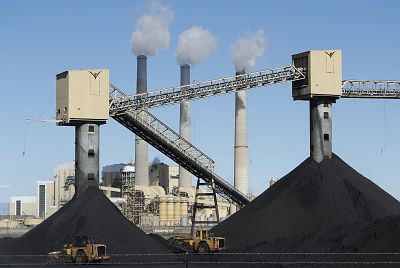Coal, petroleum and natural gas have been the main sources of energy for centuries, but the health of the planet has paid a heavy price.
Fossil fuels are in the news a lot these days — mostly because of our continuing efforts to replace them with more environmentally friendly sources of energy like solar and wind power.
The carbon emissions caused by the burning of fossil fuels are the main contributor to global warming. Of course, fossil fuels are also the main source of the energy that has driven modern civilization for centuries.
"Fossil fuels currently supply roughly 80 to 85 percent of the world's energy," says Edward Rubin, professor of environmental engineering and public policy at Carnegie Mellon University in Pittsburgh. "They are critically important for everything we do and value as individuals and as a society — all of which need a source of energy."
What are the types of fossil fuels, and where are they found?
There are three main fossil fuels: coal, petroleum and natural gas. Coal is cheap and abundant, but it releases a lot of pollutants when burned. Petroleum, or crude oil, is harder to find and is typically a bit cleaner-burning — and, unlike coal, it can be pumped through pipelines and easily refined into fuels like gasoline or kerosene. Natural gas is also relatively inexpensive and less polluting than coal or crude oil.
Fossil fuels are found underground, trapped in deposits surrounded by layers of rock. Coal beds typically lie 200 to 300 feet below the surface. Oil and natural gas deposits are typically a mile or two down, and the deepest oil and gas wells have reached more than six miles below the surface.
Environment
Fossil fuel deposits are found all over the world, but some countries have more than others. The United States, Russia and China have the world's largest coal deposits. Roughly half of the world's oil and natural gas reserves are in the Middle East.
In the U.S., petroleum is produced in 32 states and in coastal waters — and most of it in five states: Alaska, California, New Mexico, North Dakota and Texas.
How are fossil fuels formed?
Fossil fuels are made up of carbon-containing (organic) molecules left over from the bodies of tiny plants and animals that lived and died millions of years ago. Most fossil fuel deposits were formed 540 million to 65 million years ago, when Earth's climate was warmer and wetter and its waters teemed with algae, bacteria and other tiny organisms.
Over tens of millions of years ago, the bodies of the once-living organisms became buried and compressed underground, forming a mineral called kerogen, or oil shale — the precursor of fossil fuels. Geothermal heat slowly transformed kerogen into fossil fuels, with some types of kerogen became coal and others crude oil or natural gas.
What are the advantages of fossil fuels?
Fossil fuels are easy to obtain and cheap to use. And they have high energy density, meaning they yield high amounts of energy per pound when burned.
The Industrial Revolution of the 18th and 19th centuries was driven mainly by coal, which powered steam engines, factories and foundries, while coal gas — a form of natural gas extracted from coal — was used for lighting, cooking and heating.
In the 20th century, oil, coal and natural gas became the primary fuels for electricity generation, and liquid fuels like gasoline, diesel fuel and kerosene became the motive power for cars, trucks, tractors, trains and aircraft.
What are the disadvantages of fossil fuels?
Unlike wind and solar, fossil fuels are not renewable — and the vast fossil fuel reserves that still exist may one day be exhausted.
A more pressing concern is the environmental damage caused by the extraction and burning of fossil fuels. The carbon dioxide released by the combustion of fossil fuels is a leading cause of global warming.
In a 2018 report, UN climate experts warned that the world faces potentially catastrophic warming if emissions from fossil fuel use can't be drastically reduced.
Can fossil fuels be replaced?
While renewable sources of energy like wind, solar and geothermalare starting to replace fossil fuels in some areas, they still meet only a tiny proportion of the world's total energy demand. It's unlikely that the world can quickly end its reliance on fossil fuels.
But experts say the transition can be made. "Ending today's reliance on fossil fuel is certainly realistic, with sufficient time and incentives," Rubin said. "But it will require massive changes in our transportation technologies — the toughest problem — as well as in our electricity supply systems."
Want more stories about energy?
- Energy kite promises a new way to harness wind power
- New refillable batteries could fuel an electric car revolution
- Fusion could be the key to powering our future, if scientists can solve one last question
SIGN UP FOR THE MACH NEWSLETTER AND FOLLOW NBC NEWS MACH ON TWITTER, FACEBOOK, AND INSTAGRAM.












